March 23, 2018
Happy Friday, welcome to what may the first full day of the "New Era of U.S.-China Relations"...
Axios is expanding with a cybersecurity newsletter called Codebook, launching Tuesday. Sign up here to get cybersecurity policy and defense news from Joe Uchill twice each week.
Thanks for reading, and remember, if you want to read me more than once a week, please check out my daily Sinocism China Newsletter and follow me on Twitter @niubi.
1. China tariffs force "New Era" to truly begin
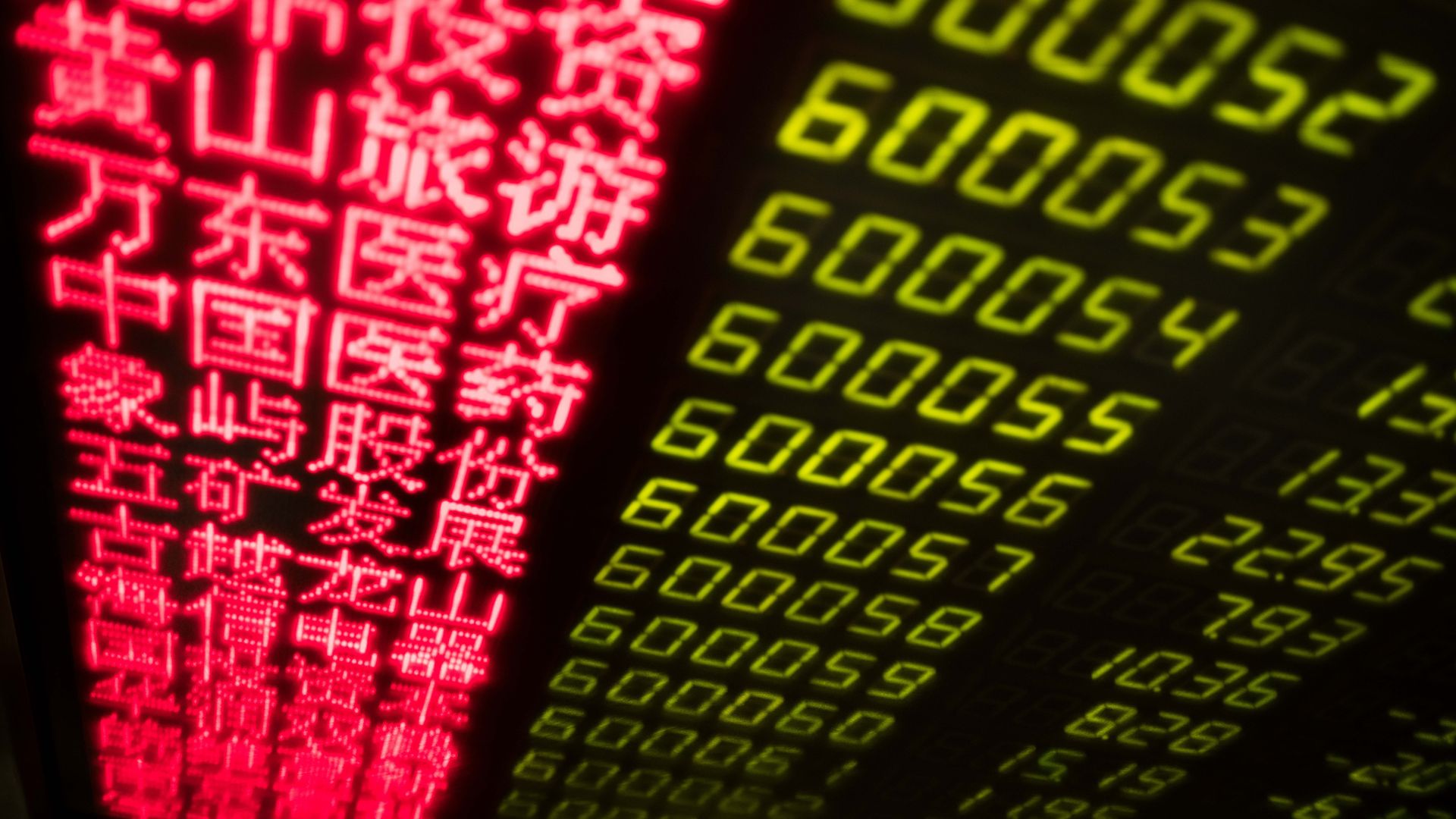
Hong Kong and mainland Chinese stocks plunged at open on March 23 due to growing global trade war fears. Photo: Nicolas Asfouri/AFP/Getty Images
President Trump has finally pulled the trigger on his long-promised trade actions against China.
What's happening: Tariffs on up to $60 billion in Chinese goods are just one part of what is coming, with the detailed list to come in 15 days, and after that a 30-day comment period, aka lobbying free-for-all.
- There will also be more restrictions on PRC investment in the U.S. and possibly visa restrictions for PRC citizens in America studying science and technology.
My thought bubble: During his visit to Washington at the beginning of March, Liu He, now a vice-premier, presented the U.S. with a list of areas in which the PRC was willing to make concessions. The Trump team did not agree but the two sides are still discussing that list, and it's possible that during the 45-day period the U.S. and China could reach agreement on broader concessions that may forestall a broader trade war, at least in the near-term.
Why it matters: Chinese President Xi Jinping declared last fall that China has entered a “New Era.” The Trump Administration, after much rhetoric since the campaign, has now signaled officially that engagement is dead and we are in a "New Era of U.S.-China Relations," in which there will be intensified competition if not outright conflict. There may be deals cut to blunt this round of tariffs, but there's little reason to expect any change in the U.S.-China trajectory towards increasing friction.
Go deeper: The tariffs are targeted at the sectors that China identified in its "Made in China 2025" plan as strategic areas it needs to dominate to become a modern economic superpower.
2. Is Trump changing U.S. policy towards Taiwan?
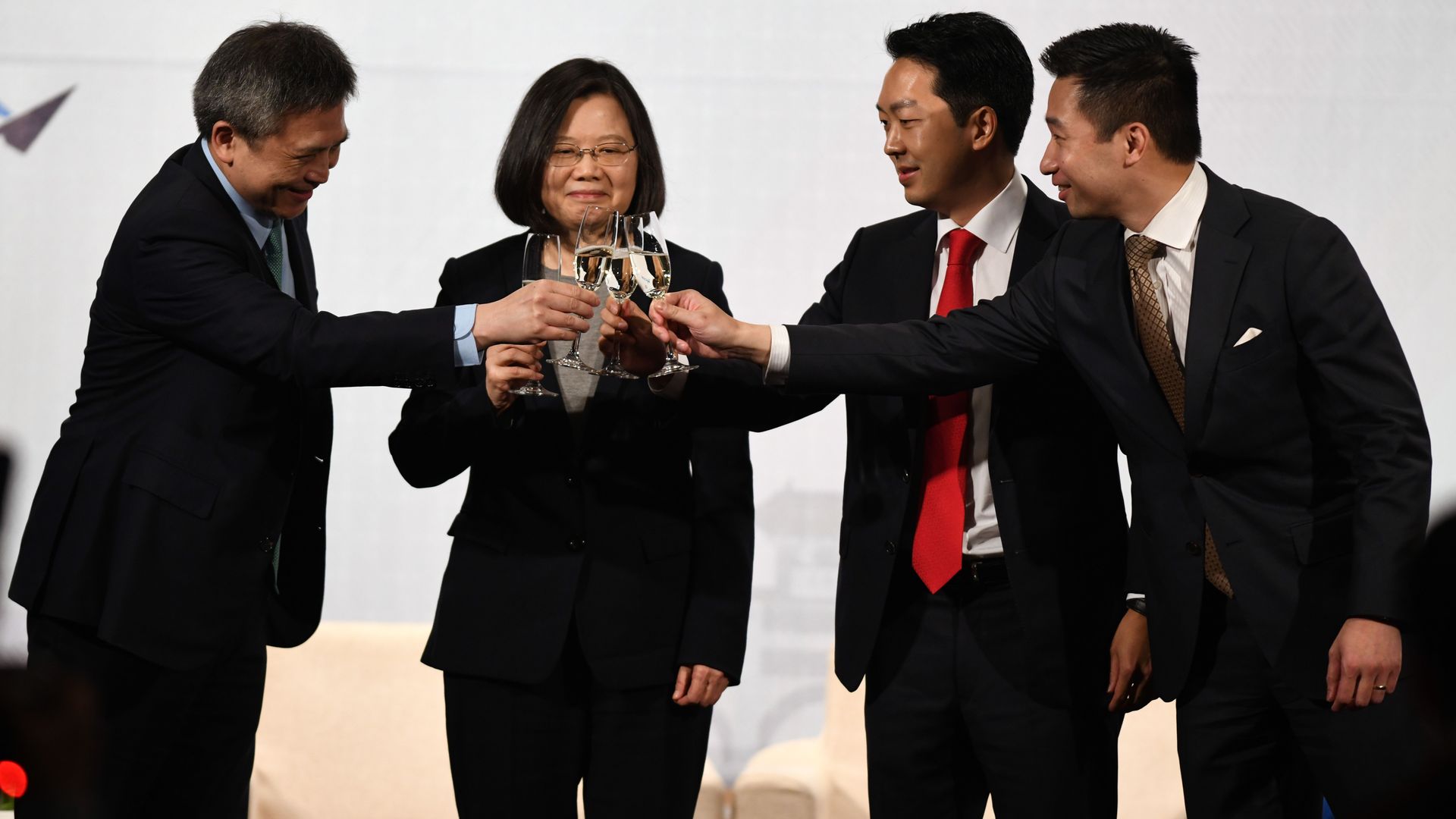
American Institute in Taiwan director Kin Moy, Taiwanese President Tsai Ing-wen, AmCham Taipei chairman Albert Chang and U.S. Deputy Assistant Secretary of State Alex Wong (from l to r) toast during a banquet in Taipei on March 21, 2018. Photo: Sam Yeh/AFP/Getty Images
Since the signing of the Taiwan Travel Act last week, the U.S. has sent two senior officials to Taiwan — Deputy Assistant Secretary of State Alex Wong and Deputy Assistant Secretary of Commerce for Manufacturing Ian Steff, South China Morning Post reports.
Quick take: Trump did not have to sign the Taiwan Travel Act as it would have come into force anyway. Beijing views his affirmative signing as a signal that Trump may be reverting to his pre-inauguration inclination to reconsider the “One China Policy,” one of the foundations of the U.S.-China relationship.
Bigger picture: Recent administration appointments may also drive a re-evaluation of U.S. policy towards Taiwan.
- Mike Pompeo and John Bolton are known as very “pro-Taiwan,” as is Randall Schriver, assistant secretary of defense for Asian and Pacific security affairs.
- The nomination of Susan Thornton to be assistant secretary of state for East Asian and Pacific affairs is apparently dead in the wake of the firing of Rex Tillerson, and some of the names I am hearing who may be nominated for that spot are advocates of a much closer U.S.-Taiwan relationship.
Why it matters: A U.S.-China trade spat would be a sideshow to the conflicts that would arise over any fundamental changes in U.S. policy towards Taiwan. Xi has pledged to reunify Taiwan during his rule — even if the citizens of democratic Taiwan don't agree. And in his speech earlier this week at the National People’s Congress (NPC), he said again that “any actions and tricks to split China are doomed to fail.” But in this “New Era of U.S.-China Relations” anything may be on the table.
3. Some key outcomes of the NPC
The NPC meeting concluded earlier this week. These are some of the more significant outcomes:
- The National Supervisory Commission has stood up and the state constitution was amended.
- A massive bureaucratic reorganization plan was approved that will see the Communist Party further encroach on the institutions of the state.
- The party will command everything. This mantra is seen and heard everywhere — “党政军民学,东南西北中,党是领导 一 切的 the party, government, military, society, education, north, south, east, west — the party leads everything."
- Wang Qishan is now vice president and the de facto eighth member of the Politburo Standing Committee.
- The four vice premiers are Han Zheng, Sun Chunlan, Hu Chunhua and Liu He.
- Two big surprises were the appointment of CCDI deputy secretary Yang Xiaodu as the head of the new National Supervisory Commission and Yi Gang as the new head of the People's Bank of China.
- Xi's closing speech was all about serving the people, achieving the China Dream and the Great Rejuvenation, and projecting China further onto the global stage.
The bottom line: The propaganda surrounding the NPC made it clear that among the country's leadership there is Xi — and then everyone else just works for him.
- The meeting also marked what looks to be the beginning of the next phase of the construction of the cult of personality around Xi. He is now officially the People's Leader 人民的领袖, The People's Guide 人民的领路人 and the State Helmsman 国家的掌舵者.
My thought bubble: It's starting to look as if Xi believes he can be like Mao without the crazy, and go down in history as one of the famous "good emperors" who occasionally appeared in China's past.
4. How China became a powerhouse of espionage
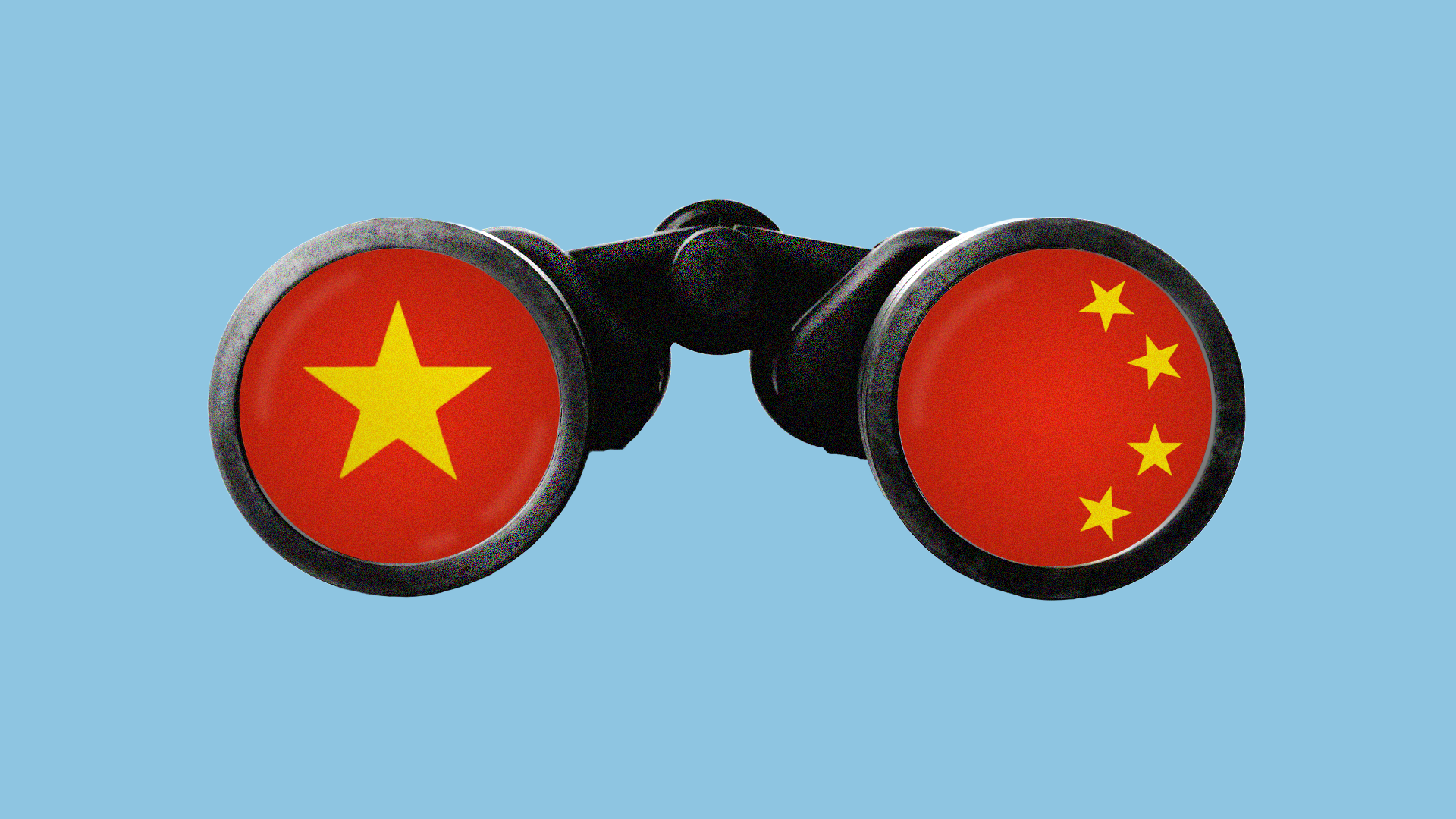
Illustration: Sarah Grillo/Axios
Axios' Erica Pandey writes: As China’s influence spreads to every corner of the globe under Xi, so do its spies.
Why it matters: China has the money and the ambition to build a vast foreign intelligence network, including inside the U.S. Meanwhile, American intelligence-gathering on China is falling short.
"We have to at least live up to [China's] expectations. And we aren't doing that."— Chris Johnson, former senior China analyst for the CIA now at the Center for Strategic and International Studies
China's intelligence strategy, per Johnson:
- Their strategy is "looking more and more like the Russians."
- "They're clearly becoming more aggressive."
- "Unlike us, they'll actually devote the resources to it."
The gritty details:
- The U.S. once engaged in broader foreign influence programs, but has shifted primarily to collecting intelligence. Meanwhile, Director of National Intelligence Dan Coats told lawmakers that China will spend $8 billion in 68 countries this year to undermine American influence and bolster its own reach.
- Xi's reform of Chinese intelligence will likely "involve reconstituting the Ministry of State Security [China's spy agency] as a two-part body, one for monitoring spies in China and another for gathering intelligence overseas," reports the Nikkei Asian Review.
- In terms of economic espionage, FBI Director Chris Wray told NBC News, "there's no country that's even close" to China.
- Now China’s playbook is starting to mimic those of traditional intelligence powers like the U.S. and Russia, Johnson says. It’s increasingly seeking intelligence for political purposes, rather than just economic applications.
- Beijing is also trying to grow its presence in the Middle East — an intelligence-gathering hotspot where it hasn't traditionally been a significant player.
Go deeper: Read Erica's full story here.
5. Naspers sells fraction of Tencent stock
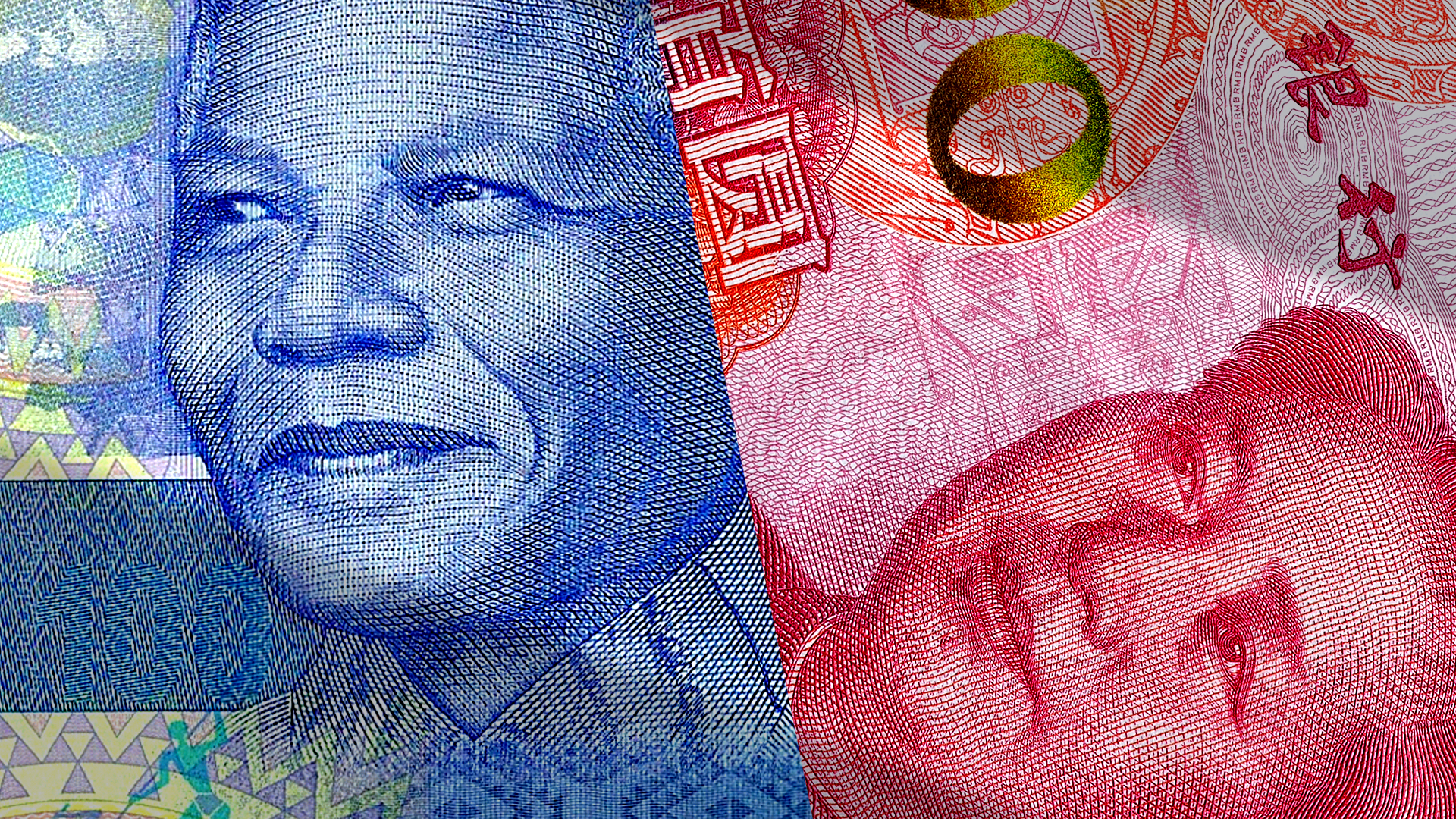
South African and Chinese currency notes. Photo illustration: Axios Visuals
South African media firm Naspers invested $32 million in Tencent in 2001. That stake is now worth over $160 billion.
The odds: Is that the greatest corporate venture capital investment of all time?
Naspers is now taking some money off the table, but the $10 billion sale is a fraction of its overall ownership and the company has promised not to sell anymore for at least three years, per Caixin Global.
Between the lines: It's remarkable that the company that owns China’s most important messaging and communication apps is 1/3 foreign-owned. That's a legacy of a far more permissive era of investing in China.
6. PRC punters might trade tech giants by June
Beijing has long wanted to bring the overseas-listed tech champions back home. The China Depositary Receipts (CDRs) are a first step.
What's new: The first companies that may take advantage of the issue of CDRs are expected to be Alibaba Group Holding and JD.com — both of which are currently listed on U.S. exchanges according to Caixin Global. They may be able to issue and trade CDRs on their domestic markets as soon as early June, the report said.
Caixin adds its sources say that Alibaba picked China's largest brokerage firm, Citic Securities, to sponsor it for CDR issuance, plus China International Capital Corp. also is seeking to be a sponsor.
7. "Xi Jinping Thought" in the classrooms
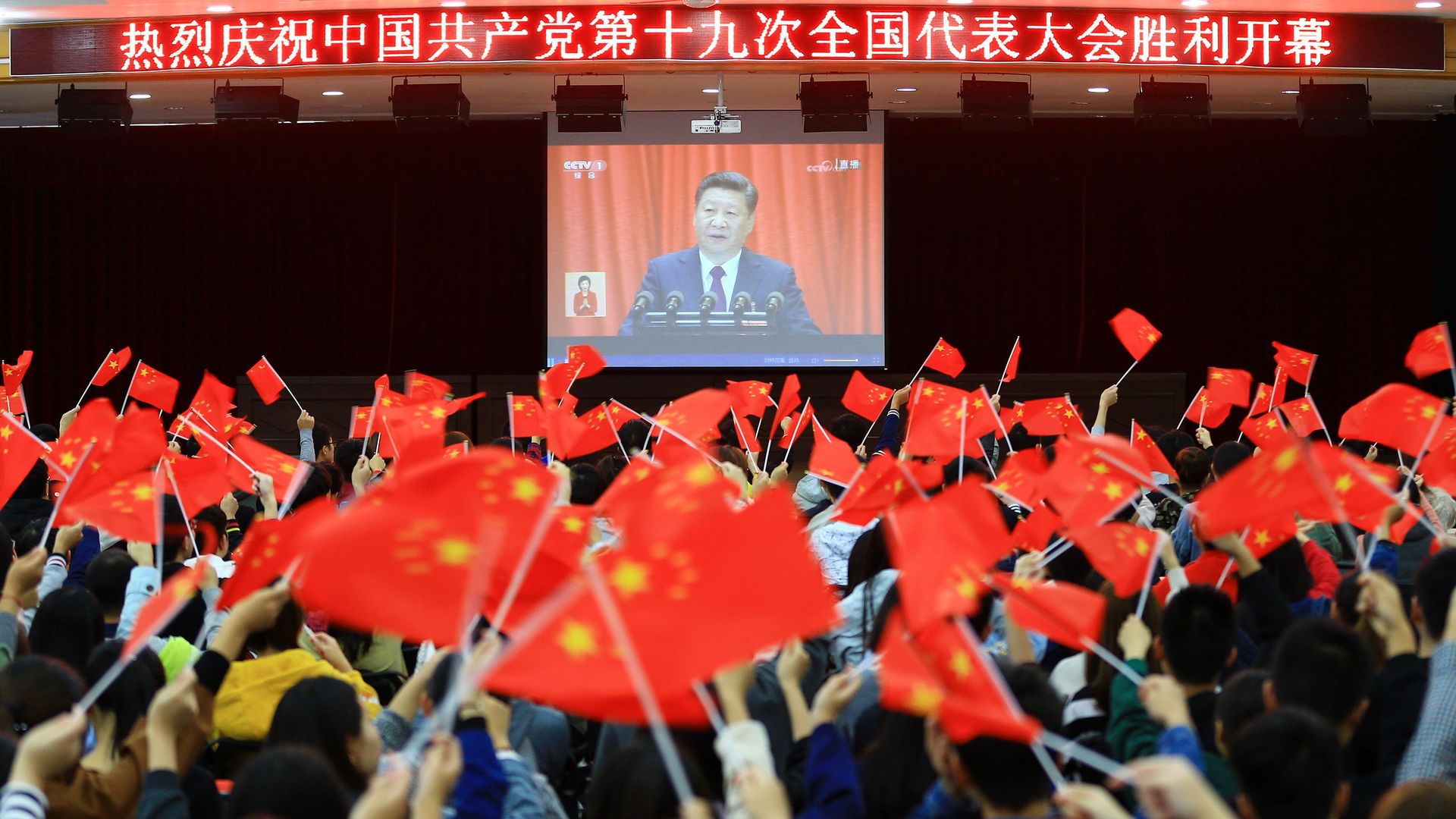
Students in Huaibei waving national flags as they watch Xi give a speech. Photo: STR/AFP/Getty Images
The Communist Party is reworking its ideological education efforts to make them more palatable to the current generation, while introducing classes on “Xi Jinping Thought.”
The Wall Street Journal takes a look:
"Xi Jinping Thought is a 14-point theory that emphasizes the party’s “people-centric” approach to governance, as well as its supreme leadership over everything in China. Enthusiasm for studying it has been mixed. Beijing’s prestigious Peking University this month scrapped an undergraduate course on Xi Jinping Thought, citing insufficient interest.."
"Another Beijing undergraduate called the ideology requirement “stupid”—but said such classes have become more engaging, with debates and use of multimedia such as opera performances and student-made videos. State media has also touted other efforts, including rap music devoted to Marx and virtual-reality simulations of the Long March".
As part of the massive government reorganization plan released earlier this week, China Daily writes that the party is establishing a new central leading group on education to:
- “[E]nhance the CPC Central Committee's centralized and unified leadership in the area, speeding up modernization of China's educational system and meeting the people's demands for education.”
- Improved political education will be part of its remit.
My thought bubble: When I was a student in a Chinese university in the early 1990s, I remember similar complaints about the stupidity of the political study classes. But the Communist Party won’t give up, and especially in the “New Era” under Xi in which party leadership of everything is the focus, we should expect intensifying efforts to force feed “Xi Jinping Thought” to students.
8. Worthy of your time
China Daily - Public supports helmsman in guiding China's rejuvenation
Caixin - Beijing ‘Shouldn’t Feel Marginalized’ by Kim-Trump Talks, Ex-Senior Foreign Affairs Official Says
China Media Project - When Reforms Means Tighter Controls
Elephant Room - Amazing China: a Propaganda Success or Failure?
LA Review Of Books - Can the Chinese Communist Party Learn from Chinese Emperors?
Reuters - U.S. lawmakers want China's Confucius Institutes to register as foreign agents
High Peaks Pure Earth - The Silence of the State: The Jokhang Fire and the Response of the Chinese Government
人民日报推出重磅微视频《奋斗》 - Short video on Chinese peoples’ “Struggle 奋斗”
Recent issues of The Sinocism China Newsletter.